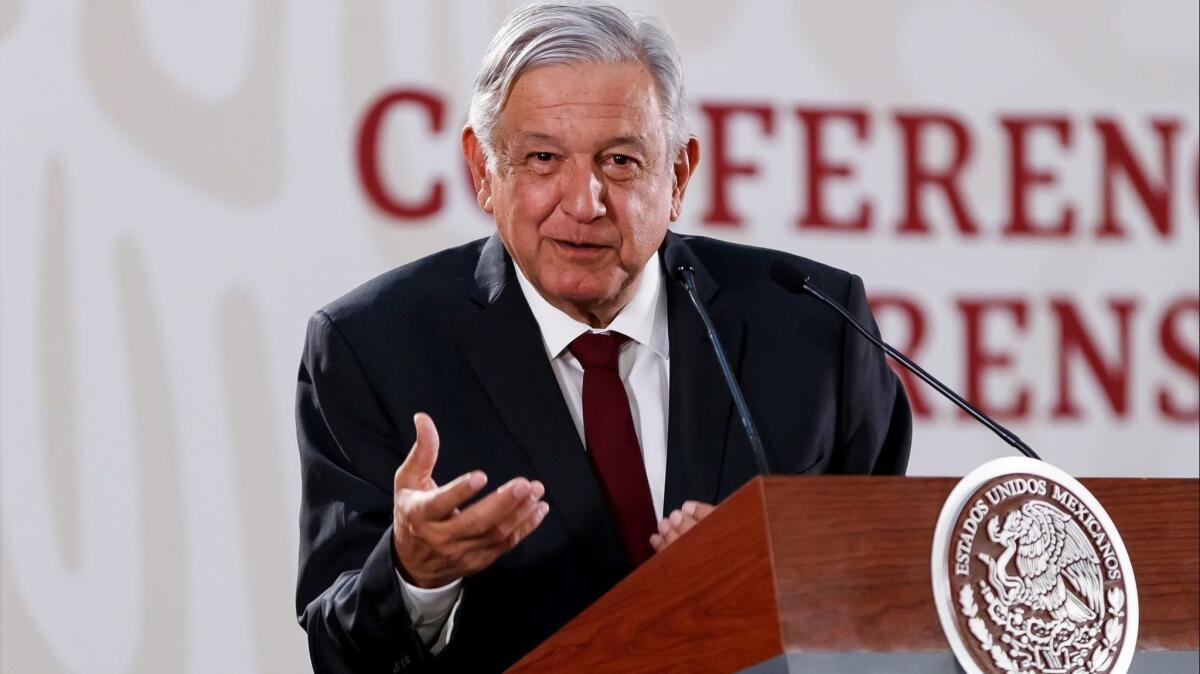Usually outspoken, Mexican president sidesteps questions on Trump’s border threat

- Share via
Reporting from Mexico City — With President Trump threatening to shut down the southwest border because of the surging number of migrants showing up there, his normally outspoken Mexican counterpart might be expected to raise his voice in protest about the prospective economic damage. But he’s not.
“I prefer love and peace,” Mexican President Andres Manuel Lopez Obrador said Monday at his morning news conference, sidestepping questions about Trump’s warnings. “We are not going to get into a confrontation with the government of the United States.”
Lopez Obrador, a leftist known for speaking his mind, has been quick to denounce domestic critics as “snobs” and recently demanded that Spain and the Vatican apologize for the Conquest, an event that happened five centuries ago.
But he has consistently refrained from engaging in a war of words with Trump.
“Lopez Obrador doesn’t want to have problems with Trump because he knows … that the only thing that could derail his government and affect his project is the chief of the White House,” wrote columnist Raymundo Riva Palacio in El Financiero newspaper. “Spain and the Vatican don’t matter.”
Last year, as president-elect, Lopez Obrador even thanked Trump publicly for toning down “offensive comments” about Mexico.
In recent days, however, Trump has ratcheted up his rhetoric, declaring a “national emergency” and threatening a border shutdown as a punitive measure against a nation heavily reliant on cross-border trade.
“Mexico … refused to help with illegal immigration & drugs!” Trump tweeted last week. “Mexico must stop illegals from entering the U.S.”
Lopez Obrador has cited the need for “prudence” and said he wasn’t going to get involved in what he characterized as U.S. “electoral” polemics.
“We are helping” to regulate the flow of U.S.-bound migrants, Lopez Obrador said on Monday, adding that he sought “a policy of friendship with the government of the United States.”
The Mexican press reported that Jared Kushner, Trump’s son-in-law and advisor, met here privately with Lopez Obrador and top aides on March 19 and relayed Trump’s threat not only to close the border but also to cancel the newly negotiated U.S.-Mexico-Canada free-trade accord, a mainstay of Mexico’s economy. The White House did not immediately respond to a request for comment.
U.S. authorities have reported escalating numbers of migrants from Central America, including many children and families, arriving at the border after crossing from Guatemala into Mexico and making their way north.
Though organized caravans of U.S.-bound Central Americans have captured headlines, officials say most migrants rely on well-organized smuggling networks.
In recent years, citizens of Guatemala, Honduras and El Salvador have eclipsed Mexican nationals as the majority of immigrants apprehended while trying to enter the U.S. illegally.
That shift has posed a growing dilemma: Mexican nationals who are in the U.S. illegally can generally be quickly returned to Mexico, but many Central Americans are released in the United States pending the outcome of applications for political asylum.
The issue of immigration remains extremely sensitive in Mexico, where venturing to the United States illegally has long been a way out of poverty. Trump’s campaign denunciations of Mexicans in the United States as “criminals” and “rapists” drew rebuke here, as has his insistence on building a border wall.
Since taking office on Dec. 1, Lopez Obrador has endeavored to cooperate with U.S. officials on an array of fronts. His administration agreed to a controversial plan whereby some Central American asylum seekers have to wait in Mexico for their cases to be heard in U.S. immigration courts.
But his government has also angered U.S. officials by handing out thousands of “humanitarian” visas to Central Americans, many of whom are headed to the United States.
Lopez Obrador, sensitive to criticism of doing Washington’s “dirty work,” also appears to be moving away from the deportation emphasis of his predecessor. Deportations of Central Americans during the first three months of Lopez Obrador’s term are down almost 16% compared with the same period a year earlier in the previous administration, official figures show.
From Lopez Obrador’s standpoint, the main drivers of illegal immigration are “the lack of opportunities” for Central Americans in their homelands and widespread violence there.
But Trump hasn’t endorsed Lopez Obrador’s calls to join Mexico in an economic stimulus plan for Central America. On the contrary, the Trump administration said Saturday that it was planning to cut aid to Guatemala, Honduras and El Salvador — a move that migrant advocates said would probably increase the undocumented flow, not diminish it.
Times staff writers Tracy Wilkinson in Washington and Kate Linthicum in Mexico City and Cecilia Sanchez of The Times’ Mexico City bureau contributed to this report.
More to Read
Sign up for Essential California
The most important California stories and recommendations in your inbox every morning.
You may occasionally receive promotional content from the Los Angeles Times.










